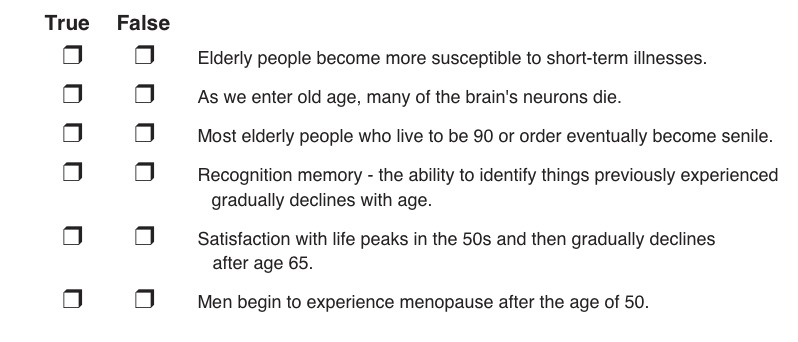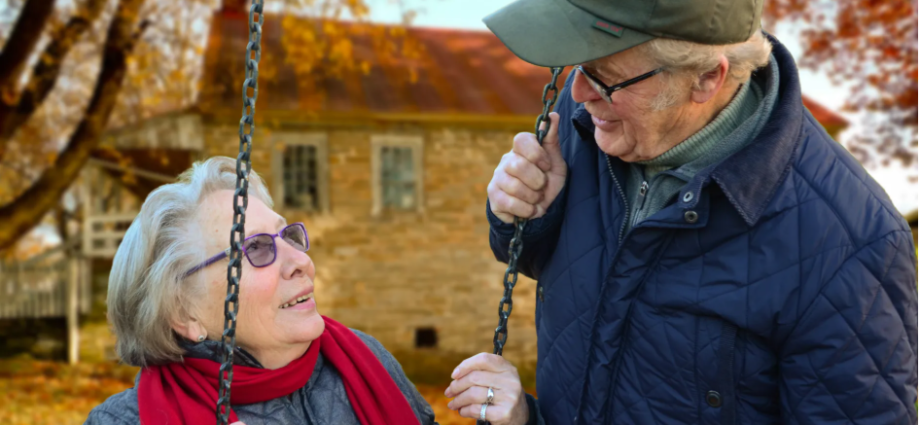What is it like to grow old? To gauge our own understanding, take a few moments to take the following quick True/False quiz:

Common Misconceptions
The above statements are all false and among the common misconceptions about aging. The elderly are the world’s most rapidly growing population group. Life expectancy at birth has increased from 49 years in 1950 to 67 in 2004 and to 80 and older in many developed countries. It is estimated that by the year 2050, Europe’s population of people over the age of 60 will rise to over 35 percent (Fernandez-Ballesteros, 2003). This dramatic increase in life expectancy is said to be humanity’s greatest achievement.
Growing Depopulation
Digging a little deeper, we find alarming trends however. While the population of the elderly is growing, birth rates in most countries are declining. Russia and Western Europe trends show massive depopulation. The United Nations projects Russia’s population will decrease by nearly one-third, from 146 million to 104 million by 2050 (Brooks, 2005). “When an entire continent, healthier, wealthier, and more secure than ever before, fails to build their human future by creating the next generation, something is seriously wrong,” proclaims George Weiger (2005), (New Atlantic Institute, American Enterprise Institute).
Why Don’t We Live to 200?
But why don’t we live even older? Why can’t we continue living until 150 or even 200 years? One theory proposed by evolutionary biologists is that as we age, our cells stop reproducing or, at least reproduce at a declining rate. We grow new cells and genes to pass them on to our offspring and the natural selection begins to subside once our gene-reproducing task is over.
Steady Decline After Child Bearing Years
Physical decline begins soon after child bearing years, as soon as early adulthood, but we are busy with our lives and unaware until later. Our eyesight, muscle strength, reaction time, and stamina all begin to diminish noticeably. In addition our hearing, distance perception, and our sense of smell all begin to diminish as we grow older.
Eyesight is especially concerning as we grow old. The pupil actually shrinks in size allowing less light into the retina. A person’s 65-year-old retina typically receives one-third as much light as a 21-year-old retina.
Neural Processing Slowdown
Age also has an adverse effect on the brain. Neural processing begins to slow. As children and teenagers, information processing is at its peak. That is why it takes older people longer to remember names and birthdays. Mental reaction times are longer when tasks are more complex and at 70 years of age, playing video games against a teenager is no match (and therefore no fun).
More Antibodies, Fewer Brain Cells
There is some good news about aging and health. Thanks to a life time accumulation of antibodies, older people fight off colds and flus more easily than younger people. However, the weakening immune system of older people makes fighting life-threatening ailments, such as cancer and pneumonia, much more difficult.
As we grow older, a gradual decrease in brain cells begins and by age 80, the brain actually has shrunk by 5 percent. Further, while women live four years longer than men generally, their brains shrink more slowly than men’s (Coffey Et al., 1998).
Exercise Grows Brain Cells
And more good news, exercising the body also feeds the brain. New brain cells and neural connections in those who remain active, help offset some of the natural brain shrinkage (Coleman & Flood, 1986). Exercising not only relieves stress and anxiety, it also stimulates brain cell development due to increased oxygen and nutrients. Physical exercise is the best antidote for aging, building muscles, strengthening bones, preventing obesity and heart disease. Physically active older adults tend to be mentally quicker than sedentary, chair-bound counterparts. Aerobic exercise programs, light jogging and dancing help memory and sharpen judgement.
Unfortunately, we are more likely to rust from disease than to wear out from over-use. So, as the saying goes “use it or lose it.”
This report is not a diagnosis. We hope this information can guide you toward improving your life.
Review our Knowledge Base or the links displayed on this page for similar and related topics.

